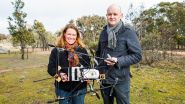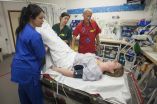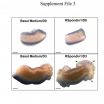Women undergoing fertility treatment can succeed with fewer hormones
New Danish research provides hope that women undergoing fertility treatment can avoid unpleasant hormonal gel by having their own body produce pregnancy hormones
2015-08-25
(Press-News.org) Since the early days of fertility treatment, women undergoing IVF treatment have had to place a hormonal gel in their vagina on a daily basis for at least 14 days after embryo transfer. The hormone is necessary to increase the chances of pregnancy, but it may also cause some side effects in the form of irritation and leaky discharge.
However, the results of a new scientific study suggest that women will be able to avoid this kind of discomfort in the future.
"Fertility treatment is a physical and mental challenge for childless couples. The daily treatment with hormonal gel after embryo transfer is the part of the treatment which many women find very unpleasant," says Peter Humaidan, professor at Aarhus University, Denmark, and the fertility clinic at Skive Regional Hospital, Denmark.
"In order to create a more patient friendly treatment, we have studied whether we can remove the usual hormonal vaginal gel and instead have the body itself produce the necessary hormones," he explains.
More natural treatment
Two test groups and one control group were examined in this randomized trial including one hundred women. The women in the control group had a standard care after the transfer of eggs including the vaginal hormonal gel, whereas the test groups only administered a small daily injection of the pregnancy stimulating hormone HCG over a two-week period.
"The results of the study show that the chances of becoming pregnant are equally good when comparing the two types of treatment given after the transfer of eggs; however, the study group who was treated with daily injections perceived this as considerably more patient friendly ," says Peter Humaidan.
He carried out the study with colleagues from the fertility clinic at the Regional Hospital of Central Denmark and the Laboratory of Reproductive Biology at Rigshospitalet, Copenhagen, Denmark.
The results were recently published in the recognised scientific journal Human Reproduction.
The first study in this area
The study is the first to show that the chances of conceiving are similar to those of the standard treatment, however, with the benefit of a reduction in hormones and a higher degree of patient friendliness
Peter Humaidan is in no doubt that the new method will be a relief for women undergoing fertility treatment:
"Even though injecting yourself can be associated with minor discomfort, the majority of women prefer doing this to the hormonal gel, which can be very discomforting. It is also, of course, an advantage that it is a more natural treatment that is generally gentler on the body. As an experienced fertility doctor I have no doubt that most women will find the injection method less intrusive and a significant improvement of their treatment," he says.
INFORMATION:
Further information
Read the scientific article here: http://humrep.oxfordjournals.org/content/early/2015/07/23/humrep.dev184.long
Contact
Professor Peter Humaidan
Aarhus University, Department of Clinical Medicine and
Regional Hospital of Central Denmark, Fertility Clinic
Tel.: + 45 2381 5991
Email: peter.humaidan@midt.rm.dk
ELSE PRESS RELEASES FROM THIS DATE:
2015-08-25
Researchers at The Australian National University (ANU) and The University of Sydney have developed a world-first radio-tracking drone to locate radio-tagged wildlife.
Lead researcher Dr Debbie Saunders from the ANU Fenner School of Environment and Society said the drones have successfully detected tiny radio transmitters weighing as little as one gram. The system has been tested by tracking bettongs at the Mulligan's Flat woodland sanctuary in Canberra.
"The small aerial robot will allow researchers to more rapidly and accurately find tagged wildlife, gain insights into ...
2015-08-25
A research team at Linköping University, together with colleagues in Europe and the United States, has shown that at extremely high pressure even the innermost electrons in the atomic nuclei of the metal osmium begin to interact with each other, a phenomenon never witnessed before. The findings have been published in Nature.
"If we know more about how a matter works, we will be in a better position to develop materials that withstand extreme conditions. In research we're constantly making advances, but in this case we've taken a giant leap", says Igor Abrikosov, ...
2015-08-25
A new £6.65 million grant for research aimed at accelerating the discovery and application of new advanced materials for the energy sector was announced today by the Engineering and Physical Sciences Research Council (EPSRC).
The grant, awarded to a team led by Professor Matthew Rosseinsky of the University of Liverpool, will support a programme, Integration of Computation and Experiment for Accelerated Materials Discovery.
Professor Rosseinsky will head up an expert team at Liverpool and University College London that will work to tackle the challenge of designing ...
2015-08-25
Noroviruses are the predominant cause of gastroenteritis outbreaks in community settings such as hospitals, cruise ships, and schools. The virus is extremely contagious and is mostly transmitted via "fecal-oral-route", i.e., through contaminated hands or contaminated food. Symptoms include violent and sudden onset of diarrhea, vomiting, and nausea.
"It is therefore important to provide a safe and harmless disinfectant against human norovirus," explains Grant Hansman, head of CHS junior research group at the German Cancer Research Center noroviruses and the University ...
2015-08-25
A simple, safe and cost-free modification to a physical technique used to treat patients in the emergency department with an abnormally fast heart rhythm could improve its effectiveness by more than a quarter, according to a study published in The Lancet today (25 August 2015).
An abnormally fast heart rhythm, also called supraventricular tachycardia, can be distressing for patients and many come to emergency departments for treatment. Symptoms can include chest pain, light-headedness, dizziness and breathlessness. Episodes can last from a few seconds or, in extreme cases, ...
2015-08-25
This news release is available in German. Trillions of bacteria populate the human gut - which makes them more common than any other cells in our body. The composition of this bacterial population is very variable and influenced by our diet. Diseases, but also antibiotic treatments can induce significant shifts in this equilibrium. If entire bacterial groups suddenly multiply heavily, critical situations occur. They damage the intestinal tissue and cause inflammations. How such shifts are triggered largely remained a mystery. Physiologists from the University of Zurich ...
2015-08-25
This news release is available in German.
Root bacteria are known to form symbiotic relationships with plants by improving the plants' supply of nutrients. Yet as scientists at the Max Planck Institute for Chemical Ecology in Jena, Germany, found recently, the bacteria actually play a much more profound role. During field experiments in Utah, in the western USA, researchers discovered that the right mixture of soil microbiota directly influences the survival of Nicotiana attenuata, a species of wild tobacco. Plants that had been unable to establish a protective ...
2015-08-25
University of Manchester scientists have bridged a gap between two separate pieces of small intestine kept alive outside the body, in an advance which could have implications for surgery in human adults and babies.
It is not currently possible to study the intestine in embryos when inside the body, which holds back advances in treatment for conditions causing damage in infants. However, new techniques used by the researchers in this study have allowed organs to be kept alive and grown on supports which allow the absorption of nutrients.
A video is available here
or ...
2015-08-25
In an era where popular culture is increasingly recognized for its impact on lay understanding of health and medicine, few scholars have looked at television's powerful role in the creation of patient expectations, especially regarding pregnancy and birth.
As part of a larger research project funded by a National Science Foundation Dissertation Improvement Grant, Danielle Bessett, University of Cincinnati assistant professor of sociology in the McMicken College of Arts and Sciences examined how women understand their television viewing practices regarding pregnancy and ...
2015-08-25
A team of researchers at the U.S. Department of Energy (DOE)'s Lawrence Berkeley National Laboratory (Berkeley Lab) developing a bioinorganic hybrid approach to artificial photosynthesis have achieved another milestone. Having generated quite a buzz with their hybrid system of semiconducting nanowires and bacteria that used electrons to synthesize carbon dioxide into acetate, the team has now developed a hybrid system that produces renewable molecular hydrogen and uses it to synthesize carbon dioxide into methane, the primary constituent of natural gas.
"This study represents ...
LAST 30 PRESS RELEASES:
[Press-News.org] Women undergoing fertility treatment can succeed with fewer hormones
New Danish research provides hope that women undergoing fertility treatment can avoid unpleasant hormonal gel by having their own body produce pregnancy hormones




